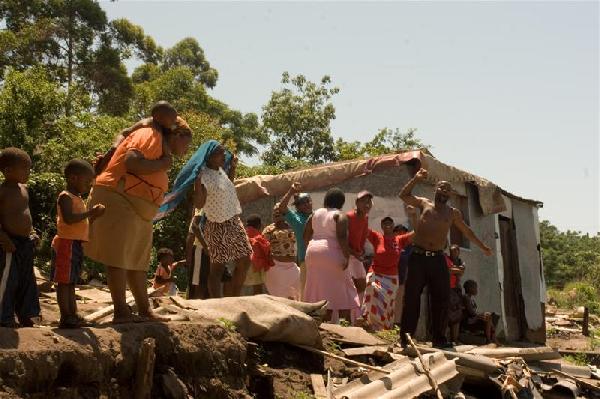Another Coffin for Another Durban Councillor: Quarry Road Marches on Jayraj Bachu
On Tuesday 4 October well over a 1 000 people, mostly from the Quarry Road settlement, marched to demand land, housing, the return of their toilets and the resignation of Ward 23 Councillor Jayraj Bachu. Quarry Road is a relatively small settlement perched on the muddy banks of the Umgeni River in the elite suburb of Reservoir Hills. The march was put to together in a few days and the organisers, the Quarry Road Development Committee, had only expected a few hundred people. But the message that the poor have a right to live in the city and should fight forced removals proved so resonant that participation exceeded all expectations.
In December last year the eThekweni Metro tried to force Quarry Road residents to accept ‘slum clearance’ followed by ‘relocation’ to the ‘rural periphery of the Metro’. Some people did agree to move but many others refused to move. There was a bitter clash with police and a number of injuries and arrests. A 17 year old boy is still in prison awaiting trial. Once people had shown that they were prepared to resist forced removals, and to resist them vigorously, there was something of a stalemate. The Metro couldn’t afford the spectacle of violent clashes between shack dwellers and police on a main road in an elite suburb. They still justify their development policy in the name of the poor and so prefer to avoid highly visible conflict . They decided on a war of attrition and removed the toilets that they had installed some years before. This is no small thing. People get sick when there are no toilets – sometimes so sick that they die. It is estimated that 3 million suffer serious diarrhoea and that 300 000 children die from diarrhoea every year in South Africa. The Metro’s attempt to force the poor out by removing their toilets is a potentially (and probably inevitably) fatal act of aggression.
The return of the removed toilets was the central demand of the march. Other key demands were for the right to live in the City and for land and housing to be made available in the city. Marchers also warned that they would “fight all attempts at forced removals” and would not allow the City to “dump them in rural areas”. The final demand was for the resignation of the Councillor and for the keys to his office to be handed over the people. The tone of the march was uncompromisingly militant. Speakers demanded that Bachu hand over the keys to his office immediately, forced him to take questions from the marchers and made it clear that they would not vote, for Bachu or anyone else, until their toilets had been returned and they had been given land and housing in the city.
This was the third large legal march by shack dwellers in Durban this year. Just over two weeks ago more than 5 000 people, mostly from the Kennedy Road settlement, marched to demand land, housing, toilets and the resignation of Ward 25 Councillor Yacoob Baig.
The Quarry Road and Kennedy Road marches carried mock coffins with their councillors’ names on the side and ended with mock funerals. The City has not taken this well. The very first public intervention of the new eThekwini Municipality speaker James Nxumalo has been to slam the mock funerals as unacceptable. Nxumalo said that in a context where two councillors have already been assassinated this month and that a number of others have received death threats the mock funerals are “a serious matter”.
In response to the Kennedy Road march City Manager Mike Sutcliffe revived the racist agitator thesis and argued that the protesters are being ‘used’. Sutcliffe blamed the protests on a prominent white academic. Ironically that academic has never set foot in any of the settlements or even met any of the people who organised the marches. Bachu tried to dismiss the Quarry Road march as the work of ‘outsiders’. But ANC hacks are going to struggle to explain away the Quarry Road march. It had the full and enthusiastic support of all political (and generally apolitical) groups in Quarry Road. The ANC civic umbrella body SANCO has a presence in Quarry Road and even SANCO supported the march fully and worked hard to make it a success. The SANCO rep, Angelina Mosiea, standing in front of a row of journalists and wearing a SANCO t-shirt and cap, called on people not to vote and demanded that Bachu hand over the keys to his office. Even paid up card carrying ANC cadres are in open revolt. The party is in as much disarray at the bottom as it is at the top.
Reservoir Hills has consistently been the safest ward in the whole country for the ANC. But if the Metro continues to try and force the poor out of the city the ANC will no longer get the votes of the shack dwellers and the rich will no longer be able to pretend to themselves that a vote for the ANC is a vote for the poor. The battle lines of the future are becoming clear.
Sifuna izindlu esamhlala la Clare Estate!
Asivoti ngoba asiboni ntuthuko!
Phansi ngobachu ngoba akasisebenseli!
Siyahlukunyezwa ngabomthetho amaphoyisa!


